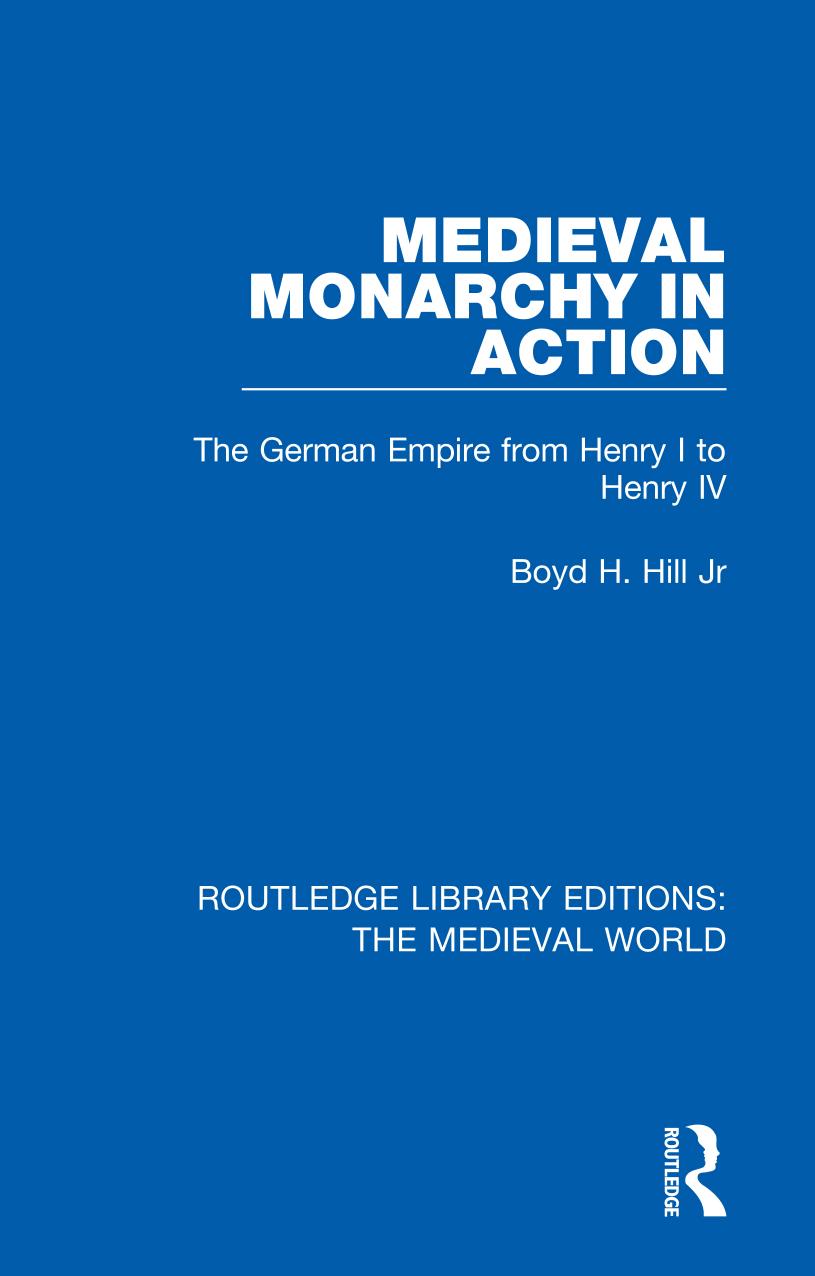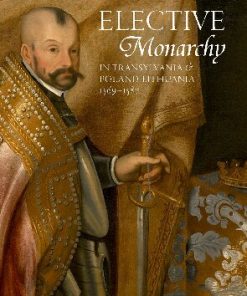Medieval Monarchy in Action: The German Empire from Henry I to Henry IV Boyd H. Hill Jr 1st Edition
$50.00 Original price was: $50.00.$25.00Current price is: $25.00.
Medieval Monarchy in Action: The German Empire from Henry I to Henry IV Boyd H. Hill Jr 1st Edition – Ebook PDF Instant Download/DeliveryISBN: 9780429536830, 0429536836
Product details:
- ISBN 10: 0429536836
- ISBN 13: 9780429536830
- Author:Boyd H. Hill Jr
Originally published in 1972, Medieval Monarchy in Action covers a period extending from the reign of Henry I to the early years of Henry IV. The book examines how the Saxon and Salian monarchs of the tenth and eleventh centuries built the foundations of the German Empire, this volume contains fifty documents which present the reader with the vivid picture of the imperial activities. The book contains original source material, including diplomas issued by the emperors, most of which have never before been published in English. Both the introduction and documents reveal the workings of the imperial chancery, the utilization of the Church as the foundation for building a strong monarchy, and the careful conscription of learned ecclesiastics into the royal bureaucracy. The period of Saxon-Salian dominance is an important area of study for papal-imperial relations in the Middle Ages and also for modern European history.
Table contents:
1 Henry I grants immunity, customs, and election rights to Fulda (Fulda, 920)
2 Henry I frees the priest Baldmunt (Rohr, 926)
3 Widukind, The royal coronation of Otto I at Aachen (936), from Res gestae Saxonicae
4 Widukind, Count Gero against the Slavs (939–63), from Res gestae Saxonicae
5 Otto I grants a village march in the district of Zeitz to Count Gero (Allstedt, 945)
6 Hroswitha of Gandersheim, The achievements of Otto (Gesta Ononis)
7 Liudprand of Cremona, A chronicle of Otto’s reign (Liber de rebus gestis Ottonis)
8 Otto I confirms territories to Pope John XII (the so-called Ottonianum; Rome, 962)
9 Otto I and Pope John XIII try Rainerius for invading Ravenna (Ravenna, 967)
10 Otto I confirms donations to Bishop Rather of Verona and puts him under his protection (Balsemado, 967)
11 Otto I renews the treaty with the Venetians (Rome, 967)
12 Otto announces his intention of making Magdeburg an archbishopric (968)
13 Otto II gives his wife Theophano great properties on both sides of the Alps (972)
14 Otto II gives the monks at Regensburg a farm which they had bought from the Jew Samuel (981)
15 Under Otto II’s chairmanship the quarrel between the abbot of Volturno and Count Landulf about cloister property is decided (981)
16 Thietmar of Merseburg, Otto II’s fight for south Italy (981–3), from Chronici libri VIII
17 Gerbert of Aurillac, Letter to Archbishop Willigis of Mainz asking him to support Theophano (984)
18 Otto III writes to his grandmother about his elevation to imperial office (996)
19 Otto III confirms immunity to the cloister of Hornbach and gives them indemnity and compensation for slain churchmen (993)
20 Otto III grants his ministerialis Sigibert the locality of Emmikenrot in the Mark of Pöhlde including serfs (Gandersheim, 997)
21 Otto III informs Gerbert about the journey of his opponent Arnulf to the pope (997)
22 Otto III writes to Pope Gregory V about his arrangements for eight counties in Italy (996)
23 Otto III grants eight counties to the Church of St Peter (1001)
24 Pope Sylvester II exempts the abbot of Fulda from all control except that of the Holy See (999)
25 In the presence of Otto III the law of the emperor and the empire is recognized with respect to the cloister of the Holy Saviour and of St Felix of Pavia against Countess Rotlind and her son (Pavia, 1001)
26 Henry II confirms immunity to the abbey of St Gall but demands participation in the election of abbots (Zurich, 1004)
27 The Synod of Frankfurt confirms the founding of the bishopric of Bamberg by Henry II (Frankfurt, 1007)
28 Henry II settles the dispute over Gandersheim between Archbishop Willigis of Mainz and Bishop Bernward of Hildesheim (Werla, 1013)
29 Henry II bestows the abbey of Helmarshausen on the episcopal church at Paderborn (Leitzkau, 1017)
30 Henry II regulates the punishment of disputes between the people of the cloisters at Fulda and Hersfeld (Bamberg, 1024)
31 Wipo, The election and consecration of Conrad II (1024), from Gesta Chuonradi imperatoris
32 Conrad II confirms two estates and a hide of land to the cloister at Peterlingen (1024)
33 With Conrad II and his son Henry presiding, the claims of Duke Adalbero of Carinthia to fodrum and other services are denied (S. Zeno near Verona, 1027)
34 Bishop Kadeloh of Naumburg secures in an imperial document certain concessions for merchants from Grossjena (Memleben, 1033)
35 Conrad II regulates legal relations of feudal tenants in Italy (the so-called Constiturio de feudist at the siege of Milan, 1037)
36 Conrad II gives to the episcopal church at Cremona the property of Adam of Cremona, who had murdered the Cardinal-deacon Henry of Cremona (1037)
37 Conrad II orders Roman judges to decide cases involving a Lombard according to Roman law if carried out in Roman territory (1038)
38 Henry III restores a fief to the monastery of Hersfeld, which had been taken away by Conrad II (Goslar, 1043)
39 With Henry III presiding in royal court, a dispute between Bishop Bernard II of Ascoli and Albasia, wife of Pandulf, is decided in favour of the bishop (S. Marotto, 209 1047)
40 Henry III orders that no secular or regular clergy and no nun shall be forced to take an oath in criminal or civil cases, but that all religious should take an oath via their advocate (Rimini, 1047)
41 Henry III permits the inhabitants of Val Scalve trade in iron and frees them from customs, fodrum, and other public duties in exchange for a yearly payment of 1,000 pounds of iron to the royal court at Darfo (Mantua, 1047)
42 Henry III issues a law for Italy against the crimes of poisoning and assassination (Zürich, 1052)
43 Henry III issues a law about forbidden marriages (Zürich, 1052)
44 Henry IV gives several farms to the monastery of Sts. Simon and Jude at Goslar (Kessel, 1057)
45 Henry IV confirms for Count Ernest of Austria the privileges of emperors Julius Caesar and Nero (spurious; Dürrenbuch, 1058)
46 Henry IV confirms to the archiepiscopal church of Hamburg–Bremen certain forests and allows the dependants of the church to sell their property among themselves (Regensburg, 1063)
47 Adam of Bremen, The downfall of Archbishop Adalbert (1063–72), from Gesta Hammaburgensis ecclesiae pontificum
48 Henry IV gives toll privileges to the citizens of Worms and thanks them for their support (1074)
49 Anon., The early years of Henry IV, from Vita Heinrici IV imperatoris
50 Helmold of Bosau, The public penance of King Henry, from Chronica Slavorum
People also search:
monarchy medieval
monarch in medieval europe
monarch medieval europe
english monarchy middle ages
feudal monarchies
You may also like…
Engineering - Electrical & Electronic Engineering
Fundamentals of Logic Design, Enhanced Edition 7th Edition Jr. Charles H. Roth
Engineering
History - European History
Survival and Revival in Sweden’s Court and Monarchy, 1718–1930 Fabian Persson
Romance - Contemporary Romance
Politics & Philosophy - Anthropology
History - American Studies
Politics & Philosophy - Social Sciences













